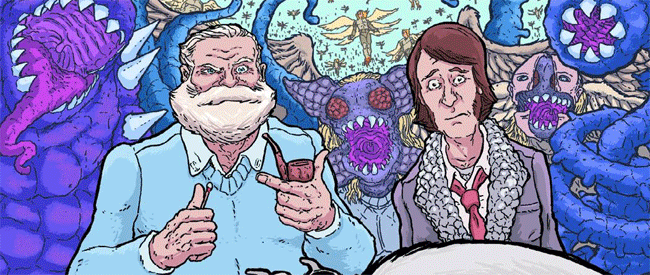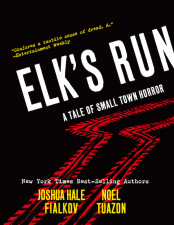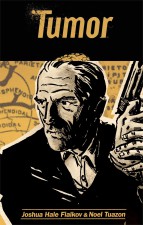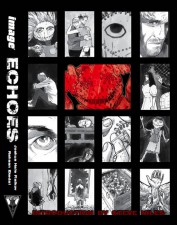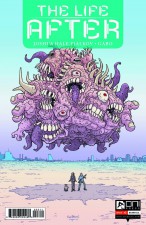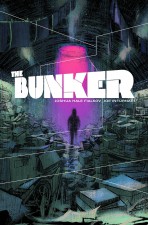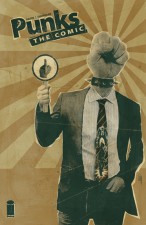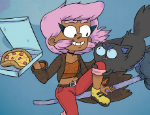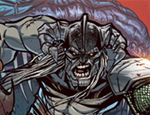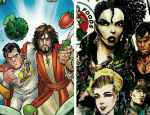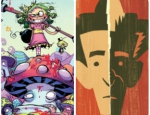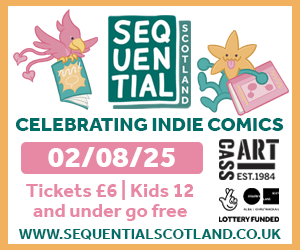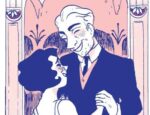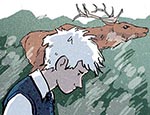Broken Frontier columnist turned A-list writer Joshua Hale Fialkov has left his mark in both the mainstream and – increasingly – the world of creator-owned comics. He spoke to us about chewing things up for the reader, the secret of good collaboration and the strange lack of controversy over the Comics Potato God.
Joshua Hale Fialkov is contributing to the Broken Frontier Anthology, created to celebrate the magic of creator-owned comics. Check our Kickstarter campaign and please share it with your friends on social media using #BFanthology. You can find Josh on Twitter @JoshFialkov.
Can you give us a quick summary of your work to date?
That’s… a lot. I actually started my career in comics as a columnist for Broken Frontier a LONG time ago.
I worked on some webcomics and anthology books while I learned the ropes of the industry, and then I did a book called Elk’s Run that was originally published by Random House (and will have a deluxe tenth anniversary hardcover edition from Oni Press later this year.)
I did a few more indie creator owned books like Tumor and Echoes, and then I did I, Vampire at DC, The Ultimates at Marvel, and am now once more into my first love, creator-owned comics.
What can you tell us about your upcoming story in the anthology?
I think the best part will be getting to work with Ryan Kelly. The guy is a beast. Immensely talented and a wonderful storyteller. I was flattered to even have the chance to talk to Ryan, let alone…
How did your collaboration with Ryan Kelly come about?
All credit to Frederik Hautain, who’s putting the whole jam together.
You’re working with some great collaborators at the moment. What’s the secret of a successful collaboration in comics?
A lot of it has to do with respect, honestly. Knowing that each of you wants nothing more than the best book possible, and finding a way to communicate that openly, clearly, concisely, and honestly is at the core of it.
I talk with Gabo (from The Life After), Joe Infurnari (from The Bunker), and Kody Chamberlain (from Punks) literally daily. And it’s not a chore. It’s a pleasure because they make me better in every way.
In work like The Bunker and The Life After, you put a lot of faith in the reader to work things out. Do you think comics – and maybe pop culture more widely – have a tendency to chew things up too much for the audience?
I’m working on the pilot for a TV show adaptation of The Bunker right now, and that really is one of the challenges. In comics, when you go over the top with information, the reader slows down and takes it all in, versus in TV or film where if they miss information it’s simply gone.
In The Life After you cooked up a fairly provocative remix of Judeo-Christian mythology. Have you faced any kind of hostility over that?
Despite the Comics Potato God, the outright disgust for certain religious principles, and a lot of naked Ernest Hemingway, not really.
I think the book’s heart is in the right place, and it’s core message is not that far from what Jesus, Moses, Mohammed, and Vishnu all said. Stop being an asshole to other people and worry about your own behavior.
(Obviously, the four other guys were a little more deft in their phrasing.)
With an increasing number of outlets for creator-owned work, you’ve put out your last couple of projects with Oni. What makes them a good fit for your work?
They treat me (and my collaborators) like family. I know I can talk to James or Robin or Ari, or, hell, even Joe Nozemack who owns the joint whenever I need them.
They’re responsive and they treat their books like their children. And, frankly, they do not publish bad books. Every one of those other series with the Oni brand on them are books I buy and read and love. That’s not true of any other publisher on earth.
Apart from the upcoming BF anthology, of course, what is the one bit of your work you’d recommend to a new reader?
Well, the first TPB’s of The Life After and Punks are both currently available, along with the first two of The Bunker. I’ve also got a short run on Pacific Rim for Legendary coming up, so, if you like your giant robots fighting giant monsters with a touch of ennui, that’s where you go.
What else can we expect from you in the near future?
Well, I’ve got at least two more creator-owned series starting later this year, and some pretty big non-comics stuff on the horizon, too.
And finally – what ‘frontier’ would you like to break through with your comics?
What I aspire to, and what I always search for in my ideas are things that can transcend the medium. And I don’t mean so much the physical objects, but the barriers to entry that keeps comics so much further down the radar than the other media that we inspire and fuel.





